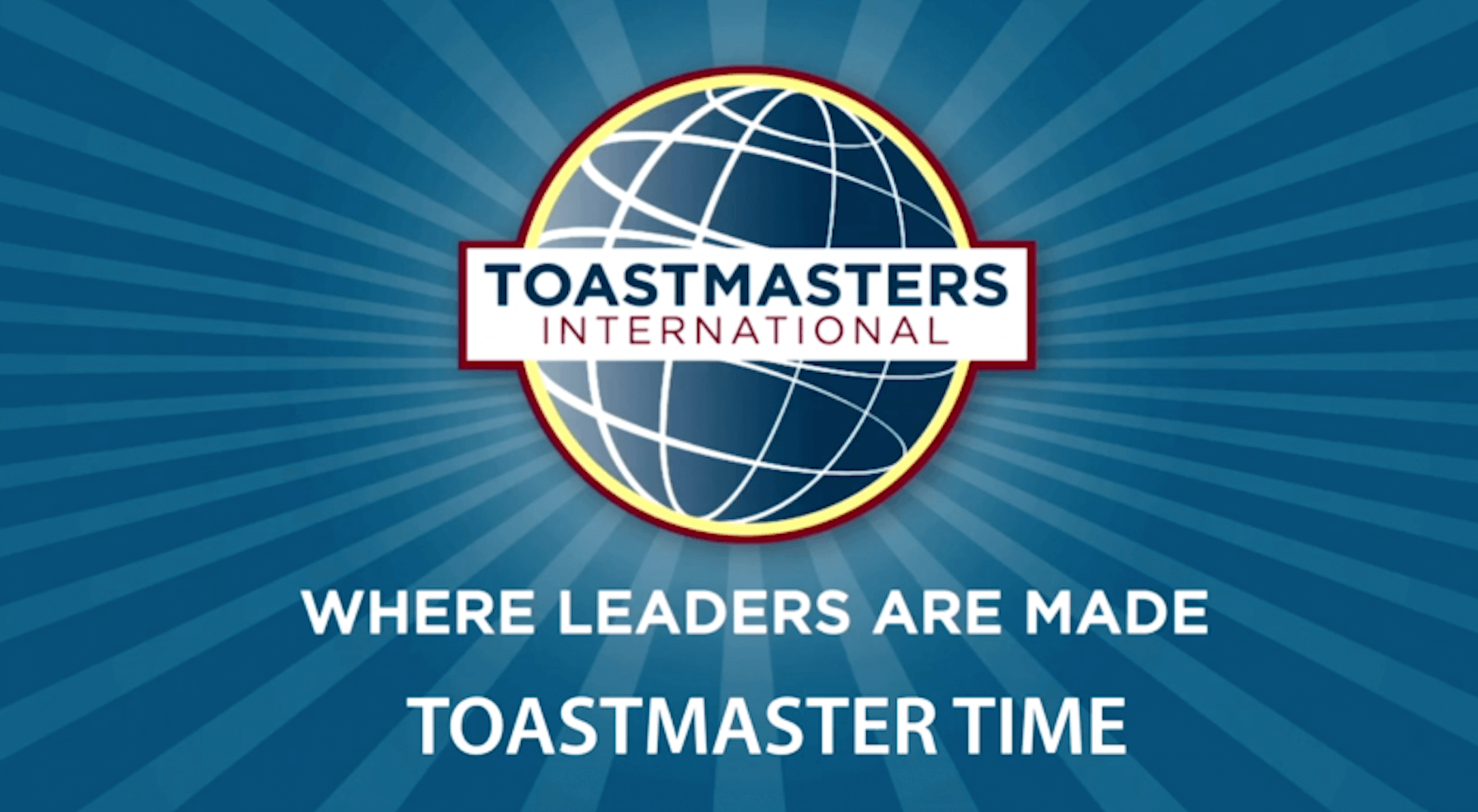Are you interested in improving your public speaking skills?
Do you want to learn how to become a professional keynote speaker?
You may have heard the name before and wondered to yourself: What is Toastmasters all about?
In this article you will learn:
What is Toastmasters?

Toastmasters is an international non-profit club run by volunteers to improve our public speaking ability by speaking regularly in a supportive environment with a solid program and helpful feedback.
The goal behind the organization is to create a central hub that would establish a core set of values and instructions so that people could form local groups in there area to support each other through their journey of becoming better speakers.
There are currently over 14,000 clubs in over 122 countries. Anyone over 18 who is interested in public speaking can join. Clubs have a great mix of experienced and beginning speakers, young and old.
The objective of the Toastmasters club is to help you build the confidence you need to give presentations and speak in public so that you can become a better leader.
Whether you work in the private or non-profit sector, at a certain point in your career you will need to get up in front of an audience and deliver a speech or presentation. By joining a Toastmasters group, you will be able to practice these skills with others who are on a similar path as you and get the feedback you need to improve.
What do people do at a Toastmasters event?
Practice their public speaking skills of course!
Everyone who attends a Toastmasters meeting will get up in front of the audience and deliver a speech or presentation.
The others will be asked to listen and then give feedback to you so that you can improve.
Of course, attending also provides a great opportunity for networking with others.
There is also the opportunity to join the “Leadership track” where you can also learn leadership skills.
9 Skills You Will Learn By Joining Toastmasters
To start out, let’s look at some of the growth you will experience with Toastmasters.
You will develop:
1. Public speaking skills
2. Presentation skills
3. Communication skills
4. Listening skills
5. Leadership skills
6. Evaluation techniques
7. Vocal variety
8. Effective non-verbal communication (body language)
9. Research techniques
Benefits Of Joining Toastmasters
If you are in customer service in any capacity, you can benefit from learning to develop your public speaking skills.
If you are an employer, you might want to encourage your staff to attend weekly meetings.
The Competent Communicator Manual gives you the opportunity to learn and practice some of the following: Organize Your Speech, Get to the Point (what do you want to achieve?), and How to Say It (Be specific, use vivid words, incorporate rhetorical devices, watch for jargon, etc.).
Have you ever been called upon at the last minute to give a presentation or a talk on something you’ve been working on, or something for a new client? Well, Toastmasters can help you think on your feet and be well organized so that this will become easy for you.
Whether you want to become a professional speaker or just need to give some presentations at work, joining a group can be very beneficial as you will gain the practice you need to improve your skills.
The Importance Of Effective Communication
Communication involves more than just talking. It also involves attentive listening. Communication is a two way conversation. Many people say, “I have no problem talking”, and those around them are well aware of that. These people may have a problem letting other people talk.
How many times have you been at a meeting where the person is supposed to speak only for 5 minutes and 15 minutes later they are still at it? At Toastmasters you learn how to craft a speech to fit within a specified time frame.
Listening skills are an important part of communication. It is important to listen well enough so that you really “hear” what the other person is saying. At our weekly meetings the Quizmaster tests the listening skills of the group by asking questions about things that went on during the meeting.
Developing Leadership Skills
Leadership skills – are developed as members take on roles such as Toastmaster, Table Topics Master, Timer, Quizmaster, General Evaluator and others.
Each person takes control of the lectern for their role and you have a chance to earn the Competent Leader award as you work through various roles such as: Speaker, Speech Evaluator, Timer, Grammarian, Ah Counter, Toastmaster, Mentoring a New or Existing Member, etc.
Giving Constructive Criticism
It is important to learn how to correctly evaluate someone so that they learn about the things they need to improve while being recognized for the things that they already do well.
If all they hear is criticism, they don’t feel very good about themselves. One of the biggest challenges of a leader is to be able to give feedback to others on their performance.
Feedback involves praising others to reinforce their outstanding performance and criticizing others to improve their performance. Often leaders are uncomfortable giving feedback.
If team members are to perform to their potential, they need to know what they are doing well, what they are not doing well, and how they can improve. If you want to improve your team’s performance, you must be able to comfortably offer feedback to team members.
Toastmasters teaches the “sandwich technique” for evaluations. Start with something positive, insert the message about things that could be improved and end with a positive comment.
Be An Interesting Speaker
Keep your conversations lively and worth listening to. Have you ever listened to a boring lecture where the person just drones on and on with no variety or depth to their voice? It’s enough to put you to sleep.
Speech #6 will help you learn how to effectively use your voice for the highs and lows to keep people’s attention, (be expressive, use pauses for effectiveness, control your volume, pitch, rate and quality).
Your body often speaks louder than your actual words and people “read” what you are saying by the way you say it. Learn how to use gestures and eye contact to keep the audience watching and listening.
Speech #5 – Your Body Speaks gives tips on how to use stance and movement, gestures, facial expression and eye contact naturally to enhance your communication.
How To Research
Research techniques are developed as you prepare for your roles. If you are providing the word of the week, you will research the word to find out where it came from and what it means.
If you are giving the Toast, you may want to look up more information on the weekly theme. If you are giving an Educational Tip, you will want to research your topic and prepare.
Speech #7 from the Competent Communicator Manual gives you tips and ideas on how to research your topic to get the facts you need to support your message.
Conclusion
As you can see, Toastmasters groups and meetings provide a great environment for you to improve your public speaking skills while building confidence and learning how to be a powerful presenter.
To find a group in your area, click here.
See also:
- How to overcome your fear of speaking in public
- How to become a keynote speaker
- What does a keynote speaker do?
- What makes a good keynote speaker?
- What its like to be a keynote speaker
- 11 Qualities of a good keynote speaker
Resources
